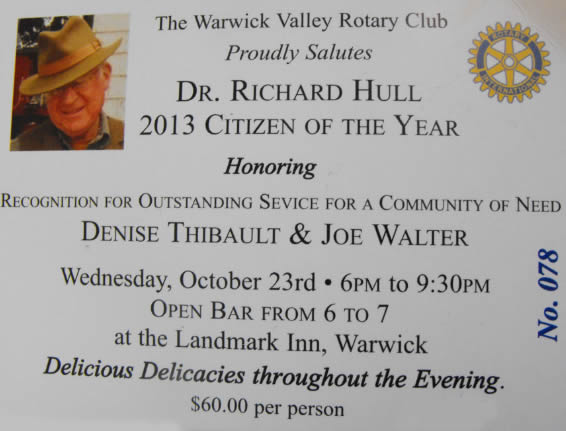
Naturally I am pleased and deeply honored to receive this Citizen of the Year Award. But I feel especially honored that it comes from a community organization that for many years has given its time, energy, and financial resources to building a stronger community and when I speak of ‘community’ I’m referring not only to Warwick but to the literally hundreds of communities regionally, nationally, and globally that are the beneficiaries of Rotarian generosity and vision.
Since its founding in 1905 the Rotary Club has grown to include chapters in nearly every nation on earth and includes more than 1.2 million members. I’ve given lectures to Rotarians in our country and in many countries of Africa and I can say that these good people are among the world’s most effective ambassadors of peace and goodwill. By their example of outreach we in Warwick have come to think locally and to act globally and to see ourselves as citizens of both the United States and of the wider community of nations.
It has been a distinct pleasure to serve as your municipal historian. For more than six decades I’ve been studying Warwick’s illustrious past and we can all be proud of our incredibly rich heritage. How many communities our size can you think of that can boast of five historical societies, three archives, ten museums, and two newspapers that have been reporting on local events, people, and institutions for a cumulative 275 years?
It is no wonder that our fellow citizens are so much in love with and so knowlegeable of our community’s past. And why is our history so vitally important to us? Well, it gives us a reassuring sense of place and rootedness in a world that is today so disruptively and dysfunctionally anonymous. It also gives us a sense of continuity at a time when there are so many discontinuities in the world.
I believe it can be argued that a community without a sense of history is like an individual without a memory. In other words, history is to our community as memory is to individual citizens. As the eminent historian Arthur M. Schlesinger, Jr. wrote: “Persons deprived of memory become disoriented and lost, not knowing where they have been and where they are going.” So a community denied a conception of the past will be disabled in dealing with its present and its future. He quotes Churchill “The longer you look back the farther you can look forward”.
Our knowledge of the past helps us to better deal with the present, and gives us a vision for the future. Yet, our past is not frozen, our conception and understanding of it changes constantly with each succeeding generation. A phone caller to a radio talk show once asked ‘is it possible to foretell the future?”. The moderator replied “No problem, we know exactly what the future will be. Our problem is with the past. That keeps changing”!.
History is like a kaleidoscope. With each turn of events and trends with each new crisis we see a different set of configurations, we discover a new picture of the past. Our parents may have wanted to know how we were governed in the past while our environmentally-concerned generation may want to know how self-reliant Warwick was a century ago and what can we learn from this as we chart a more sustainable future.
Studying history is fun because it is so dynamic, because it takes us into a time machine that allows us for a moment to live vicariously, to empathize with citizens who came long before us, to step into their shoes but with the comforting knowledge of the outcomes of their actions and decisions.
All this reminds us that we exist temporarily through what we take but we live forever through what we give. Honoring the past does not mean embalming it but rather elaborating it, using it as a developmental tool and keeping it contemporary and relevant. Aldous Huxley said that “ the free mind needs to know its past, to debate and discuss how the world came to be as it is, in order to know what to defend and what to change and how to resist imposed orthodoxies.” In short, history is essential to a functioning democracy, it is the very guardian of our freedom of thought and action.
Our community’s history must serve as both a compass and roadmap and it belongs as much to the citizen in the street as to its historians in the field and archive.
I would like to conclude with the sage words of a dear friend and faculty colleague, Dr. John Sawhill, the late president of NYU and The Nature Conservancy. “In the end, our society will be defined not only by what we create but by what we refuse to destroy."
Thank you and good night!
